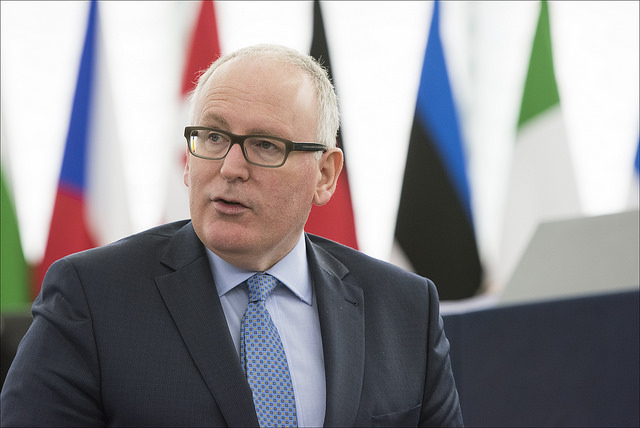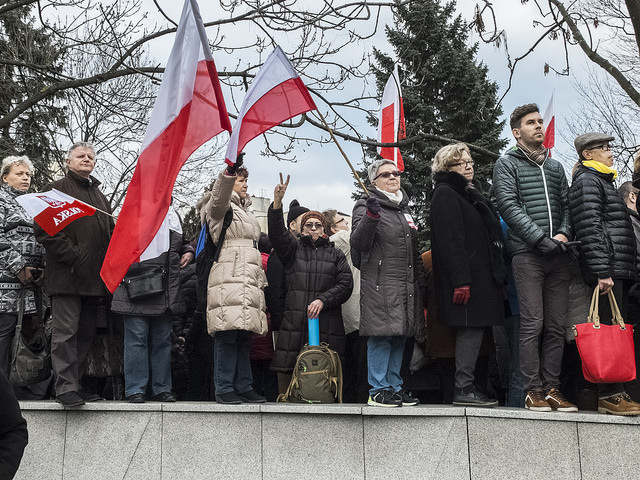by Andrea Przybyla
Today, the European Commission unveiled its long awaited proposal to reform European asylum rules. “The Dublin looks like Jon Snow stabbed on a table and dead for a couple of days…this reform is the essential thing we need to do to get Jon Snow off the table”, said Frans Timmermans, Commission Vice-President, who put forward two possible visions a month ago: one aiming to completely overhaul the current system, while the other option would largely keep the existing rules.[1]
But how true is the statement that Dublin is dead and off the table? The final proposal is supposed to ensure that the EU is equipped with an improved system that is both sustainable and fair. It incorporates an automated system to monitor the number of asylum applications each Member State receives and a reference key helping to determine when one Member State is under disproportionate pressure, followed by a fairness mechanism to alleviate that pressure.[2] Behind the Commission’s recipe for success hides a submission of the EU to national leaders as well as a failure of European solidarity. Disappointing as it is, it leaves critics of the system, particularly the controversial first-country-of-entry principle, behind with their expectations unfulfilled presenting only a mid-term solution.
National governments, particularly Eastern European states, vehemently oppose the idea of a fair re(distribution) of asylum seekers. The fear that the reform could face the same fate as last year’s plan to redistribute 160,000 asylum seekers from Greece and Italy is great among EU diplomats. So far, only 1,100 have been relocated, which is not only a mockery of European solidarity, but also a sharp blow to the EU institutions.
In place since the 1990’s, the Dublin Regulation forms the core of the EU legal framework on asylum. It has two main aims: to establish a common framework for determining which EU country decides on an asylum seeker’s application, and to ensure that only one state processes each application. Controversial from the beginning, Dublin has now proven to be a defective tool, while the unprecedented scale of the refugee crisis has become a test for the European Union in itself. Last year, more than 1.2 million refugees entered EU territory.[3] During the biggest movement of migrants since the end of the Second World War, Member States took matters into their own hands, with many too worried about the threat of uncontrolled immigration and unwilling to show solidarity with those situated on the front line.
The Hungarian Prime Minister Victor Orbán promoted the idea of a ‘Fortress Europe’, arguing that ‘European leaders had no mandate to let hundreds of thousands of migrants enter the EU with little or no control’ and that ‘[t]his [would] destabilise European democracies’.[4] The German Chancellor, Angela Merkel, promoted a fundamentally different approach of crisis management: in October 2015, the Federal Office for Migration and Refugees (BAMF) announced its intention to cease applying Dublin rules to Syrian refugees and halt all deportations to other EU countries for almost 2 months.[5] After Germany had suspended the Dublin rules, the system became de facto obsolete.
For years, critics have been claiming that the Dublin system is an expensive and ineffective regime, unfair both to bordering countries as well as migrants. Only a few “lucky” countries located at the periphery of the EU, among them Greece, Malta and Italy, dealt with 72% of all asylum applications. According to the Dublin rules, the first EU state of entry is responsible for processing an asylum application. This procedure, in fact, leaves no room for a fair distribution of refugees.
A recast of the legislation is long overdue. For many it seems that the EU has failed lamentably in the past months. Member States have returned to nationalism and isolationism. The first option, presented last month, of scrapping the Dublin system by creating a new mandatory redistribution of asylum seekers based on a country’s wealth and ability to absorb newcomers was definitely a welcome step, but that’s water under the bridge now.
The fact that European countries struggle with the smallest changes to tackle the crisis seems to suggest that the political will is insufficient and that Europe is not ready for a more centralized asylum system.[6] This was a decisive factor for the Commission when coming up with the more prudent final proposal. It is clear that, despite many efforts, the EU seems to have significant difficulties in taming its member states, moving further away from a solution than ever.
The remaining option, which forms the foundation for future reform, sticks to the old system. By adding a corrective fairness mechanism to the existing rules, refugees could be redistributed around the Union with the aim to take pressure of bordering countries. Non-complying Member States can face sanctions of € 250,000 per applicant that will have to be paid to the country which takes on the responsibility in their place.
The moral of the story? More Europe and less nation sate remains a daydream. As long as there exists stiff resistance from the Member States, the EU will be trapped in the vicious circle of status quo from which it will be difficult to escape in the future. The hope that the much criticized Dublin system might bite the dust once and for all dies with today’s proposal. Whether the new system will be fairer and based on solidarity, as promised by the Commission, will be seen in the future. And let’s not forget that the proposal will not be spared from resistance of EU Member States opposing the idea of a pecuniary “solidarity payment”.
[1] http://www.euractiv.com/section/justice-home-affairs/news/commission-says-eu-dublin-rules-as-dead-as-jon-snow-from-game-of-thrones/
[2] http://europa.eu/rapid/press-release_MEMO-16-1621_en.htm
[3] http://www.euractiv.com/section/global-europe/news/eu-to-announce-overhaul-of-dublin-rules-for-asylum-seekers/
[4] http://www.euractiv.com/section/justice-home-affairs/news/orban-slams-eu-migration-policies-ahead-of-juncker-s-mini-summit/
[5] http://www.euractiv.com/section/global-europe/news/germany-suspends-dublin-agreement-for-syrian-refugees/
[6] http://www.euractiv.com/section/global-europe/news/eu-to-announce-overhaul-of-dublin-rules-for-asylum-seekers/
Image by European Parliament, taken from flickr






